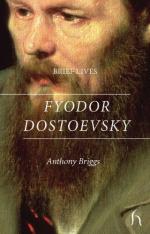|
This section contains 2,292 words (approx. 8 pages at 300 words per page) |

|
Fyodor Mikhailovich Dostoevsky was a famed Russian writer whose works reflect an intense interest in philosophical questions about the human condition. With some justification, Dostoevsky's thought has been linked with existentialism—it is unsystematic and sometimes paradoxical, and his fiction in particular is marked by a concern with the irrational in human behavior and with the burdens and blessings of free choice. In the full sweep of his writings, however—which included essays, notebooks, diaries, and letters in addition to fiction—Dostoevsky gave expression to a comprehensive Christian philosophy that cannot be classed as either existentialism or irrationalism, despite his influence on thinkers of both of those schools—the European (Friedrich Nietzsche, Albert Camus), as well as the Russian (Nikolai Berdyaev, Lev Shestov).
Metaphysics and Epistemology
Dostoevsky's conception of the human situation is rooted most fundamentally in a traditional Christian dualism: Reality...
|
This section contains 2,292 words (approx. 8 pages at 300 words per page) |

|


